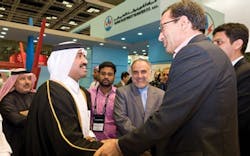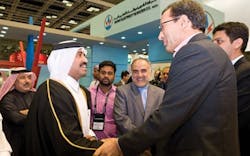Tray-Based Air Stripping System Tackles Contaminated Water
By Liz Jones
Some of the most common volatile organic compounds (VOCs) found in public water supplies are easily removed using air stripping technology. Air stripping is a process that removes or "strips" VOCs from water by contacting clean air with contaminated water across a high surface area, causing the VOCs to move from the water into the air. It is a very simple and robust process – as long as air is mixing with water, contaminant removal continues.
Two recent projects involved stripping trichloroethylene (TCE) from groundwater so the water could be used for drinking. A low-profile tray-based air stripping system was used in the projects.
The air stripping process is governed by Henry's Law. The Henry's Law constant (H) of any dissolved contaminant can be used to predict how effectively that contaminant will be driven from the water into the air. Some contaminants are easier to strip than others, for instance, vinyl chloride strips easily, benzene less so, and MTBE is relatively difficult to strip. A pilot test may be required to determine the expected level of stripping if the mixture entering the air stripper contains free-phase organics, or non-volatile, polar organic chemicals since these contaminants impact H values for the full range of VOCs present in wastewater. Temperature also affects the stripping process – higher water temperature increases stripping.
Case Studies
The U.S. Army Corps of Engineers (USACE) – Omaha District has funded the design and construction of a new groundwater treatment plant in Cheyenne, WY, to treat groundwater from the city's Borie well field. This important groundwater supply was apparently contaminated with trichloroethylene in the late 1960s at the Former F.E. Warren Atlas Missile Site 4.
The new facility was designed, constructed and placed into long-term automatic operations by Boise, Idaho-based firm McMillen, LLC. The company selected a tray-based air stripper system offered by QED Environmental. The low-profile system was incorporated into the city's existing well field hydraulic profile at a location where repumping of the water was not required.
A total of four, 6-level E-Z Tray® Air Strippers, each with a treatment capacity of 1,000 gpm, were used in McMillen's design to insure that the TCE treatment goal of less than 2 ppb could be reached without pretreatment.
Matt Moughamian, McMillen's project manager, said the tray units chosen for the Cheyenne treatment facility have more than enough capacity to handle the city water's contamination load, "and there have been no issues so far."
In October 2011, the Cedarburg, WI, Light and Water Utility installed a similar system in a discreet addition to its existing production pump building. The E-Z Tray 72.6 with 4-stage trays handles a flow rate of 600 gpm and treats groundwater containing vinyl chloride that has been traced back to a nearby landfill. The current influent into the air stripper is drinking water with less than 1 ppb of vinyl chloride, and the goal is complete removal.
Cedarburg has been using a packed tower air stripper for 18 years to treat TCE at a different supply well location, but when vinyl chloride contamination needed to be addressed, Cedarburg Water Utility Supervisor Tim Martin started looking into alternative treatment options because of design issues with the packed tower. The treatment facility sits adjacent to a residential neighborhood, so the utility also wanted to avoid the conspicuous nature of a tower.
"The packed tower system necessary to treat the vinyl chloride would have to be constructed outside and would have been about 40 feet tall. Competitive price was a factor in choosing an E-Z Tray, but I liked the fact that the whole process could be constructed indoors," Martin said.
Because the EPA requires 99% removal of all VOCs, the utility needed an efficient and reliable system. Martin realized the utility could over-design their tray system to not only treat the current level of vinyl chloride at the 99% removal rate, but be ready to treat any increases in vinyl chloride or other contaminants that may occur in the future.
"We are only utilizing four of the six trays in our system right now," Martin said. "Hopefully there won't be any major changes in the groundwater, but we are ready for the future."
About the Author: Liz Jones works with QED Environmental Systems in Dexter, MI. For more information on the company and its air stripping systems, visit www.qedenv.com/airstripper.
More WaterWorld Current Issue Articles
More WaterWorld Archives Issue Articles

